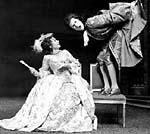THE PLAYS OF MARIVAUX are a fine tonic to our preconceptions of the historical past (in this case, 18th-century France) as being a period of almost unbearable refinement. For while his characters are dressed in sumptuous finery and are ever-so-concerned with proper manners, his adoption of the knockabout traditions of the commedia dell’arte reveals that underneath every whalebone corset and every ruffled shirt beats a heart pretty similar to your own.
The Game of Love and Chance
Seattle Repertory Theater till December 11
Commedia was an unscripted form of popular theater in which performers would use a series of stock characters (the miserly and aged Pantaloon, the trickster Harlequin, the blustering Captain Matamore) and stock situations (the braggart brought low, the young woman and the cuckolded older husband) for unscripted performances. Writers from Shakespeare to Moliere borrowed from the form for their own characters and scenarios—the numberless meddlesome parents dedicated to keeping true lovers apart, for example.
In The Game of Love and Chance, it’s not a foolish parent who complicates things for the young lovers, it’s the lovers themselves. Indeed, once Monsieur Orgon (John Procaccino, sublimely droll and characteristically laid back) finds out that his daughter Silvia (Natacha Roi) wants to switch places with her maid Lisette (Maggie Lacey) to spy on the young man who will soon arrive to propose marriage, he’s only too encouraging. That’s because he’s learned that the would-be suitor Dorante (Willis Sparks) is planning the same trick with his valet Harlequin (Dan Donohue)!
As you might imagine, a happy ending is inevitable, with both disguised servants and masters falling in love with their appropriate equals, though things are considerably complicated both by the buffoonery of Harlequin (his charming mealtime habits include spitting wine like a fountain and boisterously farting) and the slyness of Silvia, who figures things out about halfway through the evening, then decides to make her poor swain jealous by talking her actual brother Mario (Jason Gingold) into pretending to be her suitor.
Thanks to Thomas Lynch’s vast and elaborate scenic design and the rich costumes of Martin Pakledinaz (whose aristocratic variant on Harlequin’s traditional motley is the visual highlight of the evening), this is a sumptuous visual experience, and there’s some clever slapstick and much verbal felicity as well. Donohue seems slightly shackled as Harlequin, never quite cutting loose as far as one would hope, but Lacey’s send-up of her aristocratic mistress is delightful, particularly as her native bluntness keeps shining through.
BUT THE TROUBLE with this production is director Stephen Wadsworth’s annoying penchant for stylistic tricks that demonstrate the role of comedy as “serious art.” In the first act, characters deliver fully half of their lines straight out to the audience, not as asides, mind you, but in accordance with some obscure yet too plausible directorial edict. (I’m betting on “expression of the artifice of their outer selves,” but it could just as likely be “the solitary nature of their inner lives” or a half-dozen other reasons.) Even more exasperating, Wadsworth seems to believe that emotion is best displayed by a drastic change of tempo. Every time he wants us to stop laughing and see the “real” emotional power of a scene, he slows everything waaaay down and has the actors dutifully stop, look at each other, then move in some pretty fashion (be it crumpling in despair, moving to kiss, or glistening their eyes). Used in moderation, say once or twice in an evening, this could be a moving technique, but Wadsworth’s forceful hand milks the cow till he’s stolidly tugging on a dry udder.
First-time Wadsworth observers may not notice or may even appreciate these techniques; but those familiar with his productions of Coward’s Design for Living or Wilde’s Ideal Husband may begin to wonder if this celebrated director is being as true to his texts as he claims or if he’s instead using a visually stimulating but limited theatrical vocabulary in every one of his productions. This would be a shame; he’s both far too young and far too original an artist to be cultivating tried-and-true tricks, and the strengths of this show (particularly his fine and fluid translation and his clear and elegant staging) need no such idiosyncratic props.








